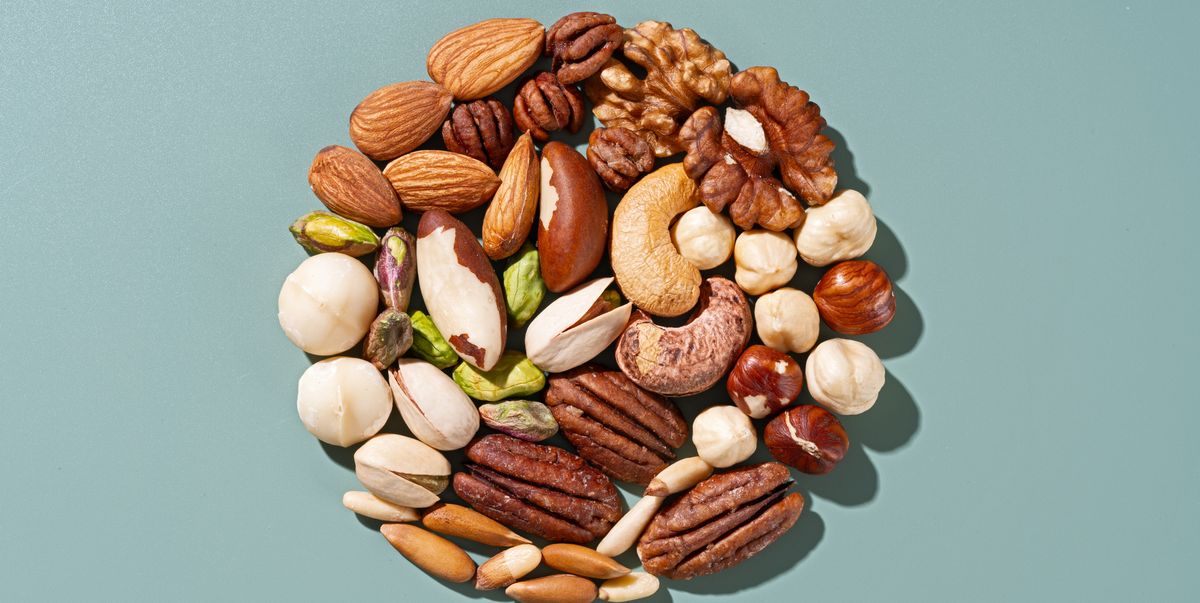In the world of nuts, pecans have always reigned supreme as a fan favorite. It makes sense: They deliver a delicious flavor and add flare to any dish. Plus, they’re really good for your health. Pecans have several key nutrients (including fiber, copper, thiamine, and zinc) and can help improve blood sugar, as well as heart and brain health, per Healthline. And now, thanks to a new study, there’s one more reason to add pecans to your list of best snacks: They could help lower your cholesterol.
At least, that’s the major takeaway from a new study published in The American Journal of Clinical Nutrition. And since high cholesterol is linked to serious health complications like heart disease and stroke, this is news worth paying attention to. Below, the study co-author and a dietitian break down the science behind these findings, and explain what they mean for your diet.
Meet the experts: Jessica Cording, RD, CDN, author of The Little Book of Game-Changers; Kristina Petersen, PhD, study co-author and associate professor in the Department of Nutritional Sciences at Penn State University
What did the study find?
The randomized controlled trial had 138 participants either consume 57 grams (or 2 ounces) of pecans a day in place of their usual snacks or to keep on eating their usual diet.
After 12 weeks, the researchers discovered that people in the pecan-eating snack group lowered their total cholesterol by about 8.1 mg/dL. They also had drops in their low-density lipoprotein (LDL or “bad”) cholesterol, non-high-density lipoprotein (HDL or “good”) cholesterol, the ratio of total cholesterol to HDL cholesterol, and triglycerides (a type of fat in the blood) compared to those who didn’t eat pecans. In total, that marks a total cholesterol reduction of about 3.75 percent, and for LDL-C, about 6.6 percent.
There was a slight downside, though: People in the pecan group gained more weight than those in the regular diet group.
How do pecans improve cholesterol?
The study didn’t dive into how pecans may improve cholesterol, but WH tapped trusted experts to better understand this relationship. And they had a few theories.
For starters, pecans contain unsaturated fats, fiber, and plant sterols, which are known to lower blood cholesterol levels, says Kristina Petersen, PhD, study co-author and associate professor in the Department of Nutritional Sciences at Penn State University. And in the study, pecans “displaced” less healthy snack foods, allowing people to focus on healthier choices, she points out.
Pecans are also rich in oleic acid, which is a form of unsaturated fat that’s linked with lower LDL and HDL cholesterol, points out Jessica Cording, RD, CDN, author of The Little Book of Game-Changers. “Generally speaking, oleic acid is considered heart-healthy,” she says.
Pecans are rich in soluble fiber, which binds to cholesterol in the stomach and helps to escort it out of the body, Cording explains. “That fiber is very helpful for managing cholesterol,” she says.
One more thing to consider: Pecans provide polyphenols and antioxidants that can help protect cells from oxidative stress (an imbalance of free radicals and antioxidants in the body that leads to cell damage), and this indirectly impacts your cholesterol, according to Cording. “If your cells have undergone a lot of damage from poor diet, sedentary lifestyle, and stress, your body isn’t going to work as efficiently,” she says. “But eating an antioxidant-rich diet helps your cells by extension and helps the body do things more efficiently, including clearing fat from the food we eat. That can be reflected in cholesterol numbers.”
How many pecans do you have to eat to see benefits?
It’s best to aim for two ounces of pecans a day, which is about two medium handfuls, Petersen says.
What else can nuts do for your health?
Nuts are a solid source of plant-based protein and a heart-healthy food, Cording says. Women’s Health actually did a deep dive into the protein benefits of various nuts you can dive into for more information.
They’re also a nutrient-dense food, giving you a lot of bang for your eating buck, Petersen says. And they’re versatile, too, as far as food goes. “Nuts can be incorporated into the diet in many ways e.g. eaten plain as a snack, added as a topping to oatmeal, breakfast cereal or yogurt, or used as a plant protein alternative to meats,” Petersen says.
If you’re looking to ramp up your diet, “nuts a great way to add nutrition to a meal,” Cording says.
Korin Miller is a freelance writer specializing in general wellness, sexual health and relationships, and lifestyle trends, with work appearing in Men’s Health, Women’s Health, Self, Glamour, and more. She has a master’s degree from American University, lives by the beach, and hopes to own a teacup pig and taco truck one day.
Read the full article here




